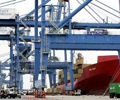Iron ore exports: India puts an end to decades-old pacts with Japan, Korea

Supply shortage of the key steel-making raw material in the domestic market is due to truncated production in Odisha as a result of output stoppage from a number of merchant mines as their leases expired.
The government is understood to have not renewed a long-term agreement (LTA) for supplying iron ore to Japanese steel mills and South Korean major Posco after upon its March expiry, apparently in view of the uncertainty over investment plans of steel mills from these countries in India. Shortage of the key raw material for steel-making in India is also seen to be a reason for the decision.
Iron ore supply agreements with Korea and Japan have been in existence for around six decades; these got renewed uninterruptedly as New Delhi’s goodwill gesture to the two Asian countries.
The Union cabinet last renewed the contract on April 25, 2018; the contract was effective till March 31, 2021.
State-owned miner NMDC, which supplies iron ore to Japan and Korea, has not dispatched any material to these countries so far in the current fiscal, sources said. Japan and Korea are the only two geographies where NMDC exports the key steel-making raw material while the rest is consumed domestically.
In 2019-20, NMDC exported 2.44 million tonne (MT) iron ore and in 2020-21, it came down by around 6% to around 2.3 MT. Sources said there have been no exports so far in the current fiscal.
NMDC used to export the ore at a concessional rate in lieu of reduced export duty at 10% against 30% for private iron ore exporters and some railway freight concessions. Another PSU, MMTC, is the canalising agency.
India has been a regular exporter of iron ore to the Japanese steel mills (since 1963) and Posco, South Korea (since 1973). In the last renewal in 2018, a total of 5.5 million tonne per annum (MTPA) of high-grade iron ore export was allowed.
Reacting to the development, private sector steelmaker JSPL’s managing director VR Sharma said, “The government has taken a very good step by stopping the export of iron ore to Japan and Korea. The local industry has been suffering very badly since long. There is no iron ore available for Chhattisgarh steel companies. The country has to meet out the local demand first.”
Supply shortage of the key steel-making raw material in the domestic market is due to truncated production in Odisha as a result of output stoppage from a number of merchant mines as their leases expired.
State-run Rashtriya Ispat Nigam (RINL) and Posco had in 2019 set up a joint working group to facilitate the implementation of the initial pact signed between the two for a 5 MTPA greenfield steel plant in Vizag with an estimated investment of `35,000 crore. In early 2021, the Centre decided to privatise RINL which has 6.3 MTPA steel-making capacity.
As per the official statement, issued in 2018, export of iron ore under the LTAs would help to strengthen India’s bilateral ties with long-standing partner countries, Japan and South Korea secure an export market and result in inflow of foreign exchange.
The agreement will enable India to secure international market for its ores and ensure stable economic ecosystem which provides direct and indirect employment in mining, logistics and related sectors.
The history of India’s iron ore exports to Japan is almost six decades old and is a consistent component of India’s bilateral relations with Japan. MMTC has been supplying iron ore to JSMs since 1963 and to South Korea since 1973, the note said.
India has free trade agreements with both Japan and Korea. In 2020-21, India imported 4.75 MT steel in which Korea had the largest share and Japan, the third largest.
Source: Financial Express

 Hellenic Shipping News Worldwide Hellenic Shipping News Worldwide, Online Daily Newspaper on Hellenic and International Shipping
Hellenic Shipping News Worldwide Hellenic Shipping News Worldwide, Online Daily Newspaper on Hellenic and International Shipping





















 PG-Software
PG-Software